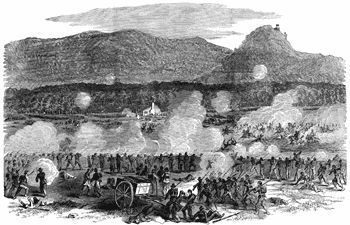 The Union Army, under Major General William Rosecrans, currently occupies Chattanooga, Tennessee following months of fighting their way through the state. Chattanooga, in southeast Tennessee, borders Georgia, separated by the mighty Tennessee River. The southern city is surrounded by mountains. Confederate General Braxton Bragg’s forces, having been forced into the mountains and ever further southward by a portion of Rosecran’s forces, in recent days retreated south of the city.
The Union Army, under Major General William Rosecrans, currently occupies Chattanooga, Tennessee following months of fighting their way through the state. Chattanooga, in southeast Tennessee, borders Georgia, separated by the mighty Tennessee River. The southern city is surrounded by mountains. Confederate General Braxton Bragg’s forces, having been forced into the mountains and ever further southward by a portion of Rosecran’s forces, in recent days retreated south of the city.
Today, however, Bragg marshals his army and turns back northward, intent on re-engaging the enemy and reoccupying Chattanooga. The Battle of Chickamauga commences two days hence in the heights above Chattanooga. When the smoke clears on the 20th, the Confederate army emerges victorious, having broken Union lines and forced Rosecrans’ forces back into the city. Chickamauga stands as the greatest Union defeat in the Western theater of the war, a much needed victory after the demoralizing Confederate defeat at Gettysburg two months earlier.
A young Baptist boy living near the nearby city of Ringgold, Georgia, witnesses the Battle of Chickamauga. Living with his mother and several older siblings, General Winship Scott Ware misses his father, who had traveled West at the beginning of the war in hopes of finding a better place to relocate his family.
G. W. S. Ware was born the ninth (and last) child in Catoosa County on April 3, 1854 to Robert and Harriett (Fortune) Ware; he was the product on both family lines of Baptists who had moved to Georgia from North Carolina earlier in the century and as an adult became a Baptist preacher and pastor in Florida. Years after the war, Ware offers his recollections of some war scenes he witnessed as a youngster.
Said Ware at age 80: “One day the calvary met, and I, from a safe distance saw the skirmish in the open plain. They played back and forth like boys. The yanks awy to the North sent a cannon ball at the Rebs, which barely missed their own men. Soon the yanks were reinforced and her they came, and away dashed the Rebs on foot. One threw up his hands, and was rushed back. Another man did not throw up his hands, and I saw him shot, and he fell on his back and lay still – the only human being I ever saw killed. Afterwards I learn, he told them that he surrendered to no yankee. How foolish, of him. That’s been 70 years ago, and he is still dead. Later I saw one cannon being fired at yanks. About a mile to the North was a stack of wheat straw. A yankee captain stood on it with a spy glass. When he saw the white smoke from a cannon’s fuse flare up, he dashed down, to escape, but just right for the ball to cut off his head. They buried his body on the creek bank, where every freshet sent water over it. After the war, when they dug to his body, to take it North, a tunnel had been made, from the creek to his body, by varmints, and had their den in his coffin. … One day a Reb. Major came in and watched my sister spin. He then remarked that he thought that was a slow way to serve the Lord. After his visit his command was later chasing Yankees, who had taken to the woods on a mountain North of us. They followed on foot. In the twilight he cried out to the top of his voice: ‘Hurry up that infantry around there, hurry them up.’ There were no infantry, but he did it to scare the yanks. We heard that he lost his life in a battle a short time later.”
Sources: Ware’s quote (link); summary of Battle of Chickamauga (link)
Note: This entry is co-authored with Arlette Copeland of Mercer University’s Jack Tarver Library’s Special Collections.


